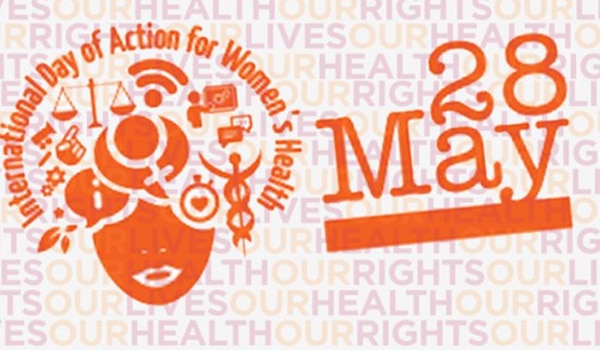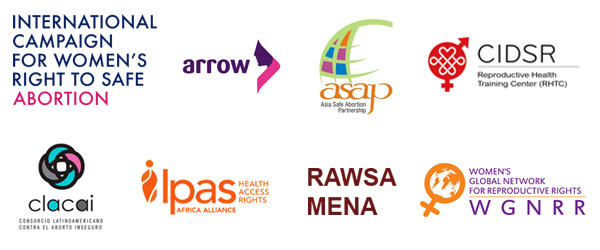
Background
Today, 28 May, is the International Day of Action for Women’s Health, which has been celebrated around the world since 1987, coordinated by the Women’s Global Network for Reproductive Rights. The theme this year is #WomensHealthStillMatters. Join women’s rights activists around the world calling on governments and the international community to ensure a rights-based, just and sustainable approach to Covid-19.
For the past several years, the Campaign 28 September Working Group has published the first Call to Action for International Safe Abortion Day on the International Day of Action for Women’s Health. This is it.
International Safe Abortion Day has been celebrated internationally since 2011. Local, national and world leaders, policymakers, human rights supporters and healthcare providers have begun to support the day with us, and there are a growing number of published reports and articles on the theme. Previous years have seen public meetings, demonstrations, rallies, festivals, plays, music, and many more. This year, taking action will be a very different experience, since it is likely to involve many more virtual actions and events, or let’s say, even more so than in the past!
This year, in the context of the Covid-19 pandemic, we call on everyone to make both 28 May and 28 September the most impactful days of action yet!!
The 28 September theme is “Self-Managed Abortion” ; the hashtag is #IManageMyAbortion
****************
Think about it!
We chose this theme because it is pushing the envelope. It is announcing that abortion methods have changed completely since the days of our mothers and grandmothers, when many of the current laws were framed, which are based on out-of-date messages. It’s time to leave them in the past.
Abortion is very safe. It rarely needs a senior doctor. It rarely needs a tertiary hospital or a hospital at all. It doesn’t need an anaesthetic, though it does need pain relief. It doesn’t need an overnight stay – or three visits to the doctor to check if you really know what you want. It doesn’t need scans or tests, before or after, certainly not routinely. And it doesn’t need someone watching you go through it, unless you want them to be there with you. It’s one of the safest known medical procedures and among the most common. One in every four pregnancies ends in abortion, and even so, there are 7.8 billion of us on this planet. It’s time to open the window and let in some fresh air, to wake up in the present and meet the future.
Abortion with pills can be very early – as soon as you miss your period – it’s simple and safe!
****************
Think about it!
The Covid-19 pandemic could help to make positive changes in seeking and having an abortion a reality – by moving abortion provision into a virtual space along with so much other health care provision, not only as a consequence of Covid-19 but also because it is technically possible and has been for a long time.
Safe abortion in women’s hands!!
****************
Think about it!
We have been trying to put the abortion decision into women’s hands for 100 years now, ever since Alexandra Kollantai convinced Lenin to pass the first legal abortion law. It’s been more than 30 years since Canada took abortion out of the law altogether, without a moment’s regret since. It’s been more than 30 years since we have been able to put the means of abortion into the hands of the one who is pregnant – abortion with pills. Abortion pills. Approved in France in 1988: defined as the property of women.
Yes, Covid-19 is being used as an excuse to threaten all the gains we’ve made. Some countries have restricted access to safe abortion and all other sexual and reproductive health services, affecting the poorest and most marginalised women and girls worst, as ever. There have been disruptions in pill production and supply chains that have affected access to medicines, not just abortion pills but also condoms, many contraceptives and other medications. National lockdowns for good public health reasons have involved self-isolation, quarantine, travel bans and closed borders. These have made physical access to all health services challenging and sometimes impossible – not because there was no option but because some countries were unprepared and aren’t coping well, while others see the pandemic as an excuse to force women to have babies they don’t want. Health-seeking behaviour has also been affected. Many people are afraid to leave their homes while pathways to care are uncertain, complex and time-consuming.
Therefore, this year’s International Safe Abortion Day is about keep our eyes on the end goal, challenging the blockages and barriers in health systems and in the minds of policymakers and providers, looking for ways of improving things, not staying in a rut, and above all, not abandoning women because of a virus. It’s about creating awareness of:
- how to arrange abortions virtually (by phone or online) with a GP, nurse, midwife, pharmacist or community health worker (training them is simple and can happen online too),
- when self-managed abortion is safe, how it works, and how to abort safely at home (up to 12 weeks of pregnancy LMP),
- what the alternatives are – either abortion with pills at home or (manual) vacuum aspiration in an outpatient clinic with minimal provider-patient contact, while ensuring later abortions (that need more time and skills) available too.
For 28 September, we call on all countries to set aside laws and policies that are restricting access to safe abortion during the Covid-19 pandemic, and allow telemedicine and self-managed abortion whenever feasible in line with World Health Organization guidance.
We recognise this will be controversial for many countries, constituting as it would a major change of policy. Nonetheless, unsafe abortion was recognised as a major public health problem in 1994. Major change is long overdue. The last thing any country needs is thousands or even millions of unwanted pregnancies and unwanted births, or a steep increase in unsafe abortions, abortion deaths and the need for emergency treatment for complications. None of us can afford this kind of regression into an anti-woman past.
We call on all States to acknowledge that abortionis essential health care,protect and fulfil women’s reproductive rights, support women’s autonomy over their own lives, and ensure universal access to safe abortion – both during Covid-19 and afterwards.
Please share this with your networks and start preparing activities.
****************
Let’s create as much of an impact online as we could in the streets.

– International Campaign for Women’s Right to Safe Abortion
– Asian-Pacific Resource & Research Centre for Women
– Asia Safe Abortion Partnership
– Central European/Western Asia Regional Network
– Ipas Africa Alliance
– Latin American Consortium against Unsafe Abortion
– RAWSA Middle East & North Africa Regional Network
– Women’s Global Network for Reproductive Rights



